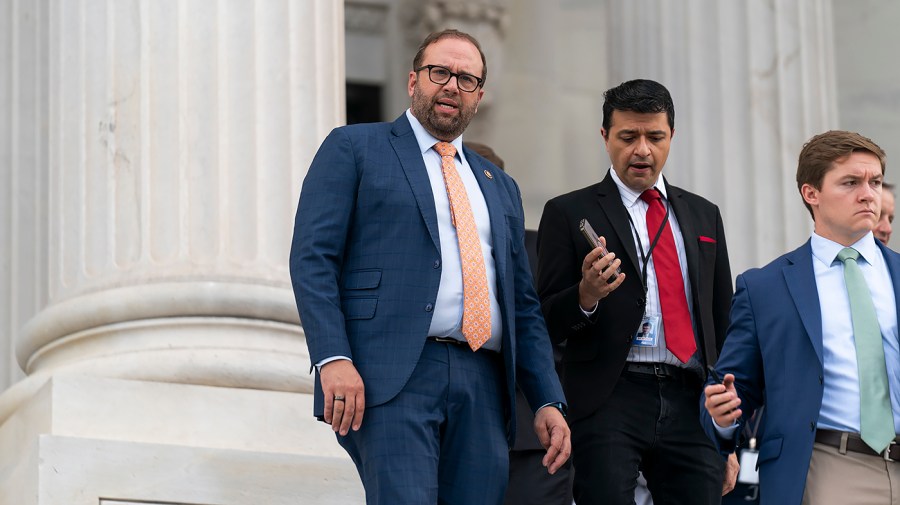GOP floats funding extension to December 2026 amid shutdown drama

Republicans on Capitol Hill are discussing extending current government funding levels until December 2026 as debate heats up about the length of a potential stopgap funding bill to reopen the government.
Republicans increasingly say a funding stopgap until well beyond Nov. 21 — the funding extension date in the House-passed “clean” continuing resolution (CR) that has failed in the Senate 11 times — will be needed to end the government shutdown, and are privately discussing new end dates, as The Hill previously reported.
But there is a divide over whether such an extension should carry over the short or long term.
On the longer-term side of things, House Ways and Means Committee Chair Jason Smith (R-Mo.) said on Bloomberg TV on Wednesday that some Republicans are talking about a funding extension for well more than a year — until December 2026.
“I’ve been hearing this conversation from senators, from House members, that a CR not just for a year, but to Dec. 1 of next year,” Smith told Bloomberg.
“I strongly support a longer-term continuing resolution,” Smith added. “I would support that until Dec. 1. I think that would allow more stability for our economy, stability for the American people.”
Such an extension would punt funding deadlines until after the 2026 midterms.
Republican appropriators, however, wouldn’t prefer that long of an extension. Congress did not approve new funding levels for fiscal 2025, opting instead to extend 2024 levels for the whole fiscal year in a March 2025 continuing resolution.
“Appropriators are committed to progressing regular order and full-year bills. The only CR we are looking at is the short-term one being jammed by Senate Democrats right now,” a House Appropriations Committee Republican spokesperson said.
GOP defense hawks would also likely be opposed to a long-term extension of current funding, fearing it would hamstring the Pentagon.
House Majority Leader Steve Scalise (R-La.) on Wednesday ruled out a CR lasting until just before the holidays in December.
“We don’t want it to be jammed up against a holiday,” Scalise said on a call with House Freedom Caucus members, as Republicans hope to avoid a Democratic push for lawmakers to approve an “omnibus bad deal.”
“We’re not going to do that. We got away from that years ago,” Scalise said.
GOP leaders are also talking about a funding extension lasting until late January, multiple sources told The Hill, which seems to have the most momentum right now — though no decisions have been made.
But some hard-liners in the House who once abhorred continuing resolutions now say they would be happy with a long-term funding extension — pointing to their trust in President Trump’s administration.
“If we can have a long-term CR so we have guaranteed funding at current levels, but we’ve got Donald Trump and the strong leadership over the executive branch using taxpayer funds wisely, then that’s a good position to be in,” said Rep. Chip Roy (R-Texas), a vocal member of the House Freedom Caucus.
Other hard-liners have said they would be happy with an extension of funding levels first set under former President Biden because it would amount to a funding cut when accounting for inflation.
While Senate Majority Leader John Thune (R-S.D.) said this week that it might be time for the House to start thinking about coming back and passing a longer-term CR, Speaker Mike Johnson (R-La.) is not yet publicly agreeing that the Nov. 21 date will have to be pushed back.
“It is going to be more and more difficult with each passing hour to get all the appropriations done on time. We acknowledge that, but we have to decide this on a day-by-day basis,” Johnson said.
And any decisions about the funding extension are only secondary to the underlying standoff between Republicans and Democrats over whether they will negotiate an extension of expiring health care premiums, which have made the 22-day-and-counting shutdown the second longest in history.
“Whatever date might be needed is really not something you can negotiate, because Democrats aren’t negotiating on anything,” Scalise said.